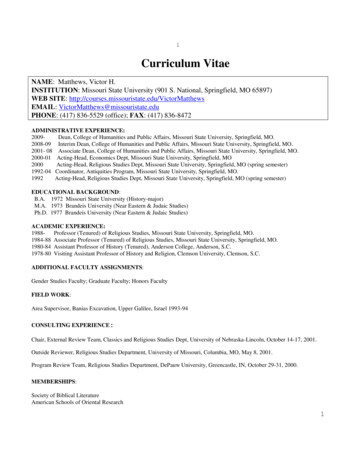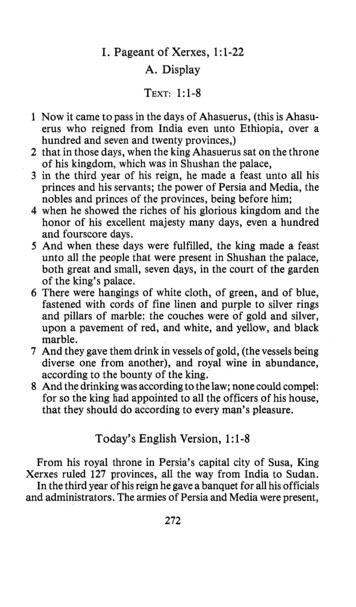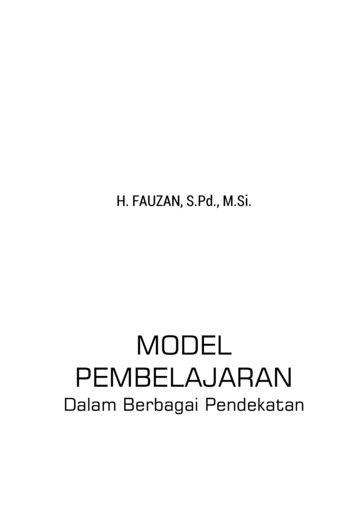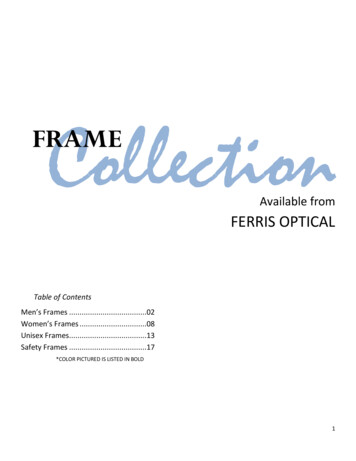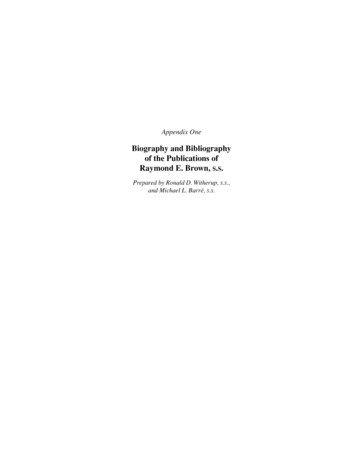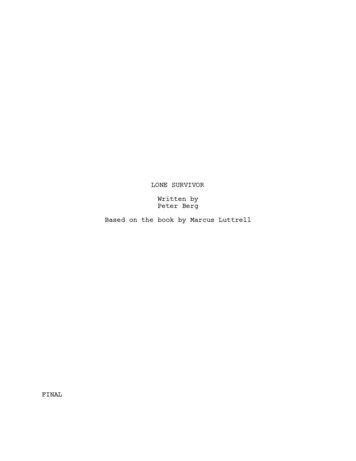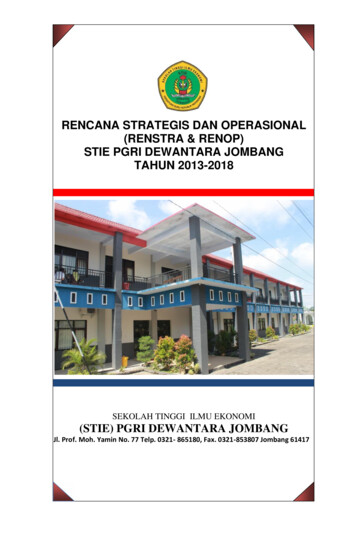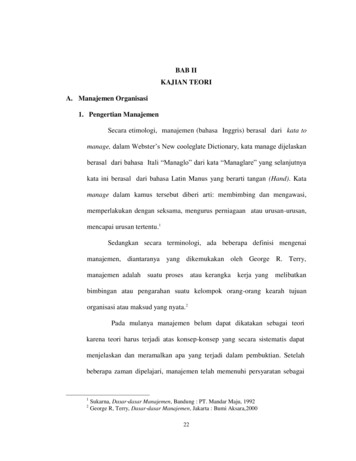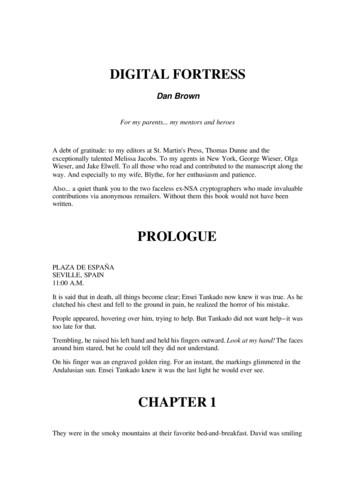
Transcription
DIGITAL FORTRESSDan BrownFor my parents. my mentors and heroesA debt of gratitude: to my editors at St. Martin's Press, Thomas Dunne and theexceptionally talented Melissa Jacobs. To my agents in New York, George Wieser, OlgaWieser, and Jake Elwell. To all those who read and contributed to the manuscript along theway. And especially to my wife, Blythe, for her enthusiasm and patience.Also. a quiet thank you to the two faceless ex-NSA cryptographers who made invaluablecontributions via anonymous remailers. Without them this book would not have beenwritten.PROLOGUEPLAZA DE ESPAÑASEVILLE, SPAIN11:00 A.M.It is said that in death, all things become clear; Ensei Tankado now knew it was true. As heclutched his chest and fell to the ground in pain, he realized the horror of his mistake.People appeared, hovering over him, trying to help. But Tankado did not want help--it wastoo late for that.Trembling, he raised his left hand and held his fingers outward. Look at my hand! The facesaround him stared, but he could tell they did not understand.On his finger was an engraved golden ring. For an instant, the markings glimmered in theAndalusian sun. Ensei Tankado knew it was the last light he would ever see.CHAPTER 1They were in the smoky mountains at their favorite bed-and-breakfast. David was smiling
down at her. "What do you say, gorgeous? Marry me?"Looking up from their canopy bed, she knew he was the one. Forever. As she stared into hisdeep-green eyes, somewhere in the distance a deafening bell began to ring. It was pullinghim away. She reached for him, but her arms clutched empty air.It was the sound of the phone that fully awoke Susan Fletcher from her dream. She gasped,sat up in bed, and fumbled for the receiver. "Hello?""Susan, it's David. Did I wake you?"She smiled, rolling over in bed. "I was just dreaming of you. Come over and play."He laughed. "It's still dark out.""Mmm." She moaned sensuously. "Then definitely come over and play. We can sleep inbefore we head north."David let out a frustrated sigh. "That's why I'm calling. It's about our trip. I've got topostpone."Susan was suddenly wide awake. "What!""I'm sorry. I've got to leave town. I'll be back by tomorrow. We can head up first thing inthe morning. We'll still have two days.""But I made reservations," Susan said, hurt. "I got our old room at Stone Manor.""I know, but--""Tonight was supposed to be special--to celebrate six months. You do remember we'reengaged, don't you?""Susan." He sighed. "I really can't go into it now, they've got a car waiting. I'll call youfrom the plane and explain everything.""Plane?" she repeated. "What's going on? Why would the university.?""It's not the university. I'll phone and explain later. I've really got to go; they're calling forme. I'll be in touch. I promise.""David!" she cried. "What's--"But it was too late. David had hung up.Susan Fletcher lay awake for hours waiting for him to call back. The phone never rang.***Later that afternoon Susan sat dejected in the tub. She submerged herself in the soapy waterand tried to forget Stone Manor and the Smoky Mountains. Where could he be? shewondered. Why hasn't he called?
Gradually the water around her went from hot to lukewarm and finally to cold. She wasabout to get out when her cor dless phone buzzed to life. Susan bolted upright, sloshingwater on the floor as she grappled for the receiver she'd left on the sink."David?""It's Strathmore," the voice replied.Susan slumped. "Oh." She was unable to hide her disappointment. "Good afternoon,Commander.""Hoping for a younger man?" The voice chuckled."No, sir," Susan said, embarrassed. "It's not how it--""Sure it is." He laughed. "David Becker's a good man. Don't ever lose him.""Thank you, sir."The commander's voice turned suddenly stern. "Susan, I'm calling because I need you inhere. Pronto."She tried to focus. "It's Saturday, sir. We don't usually --""I know," he said calmly. "It's an emergency."Susan sat up. Emergency? She had never heard the word cross Commander Strathmore'slips. An emergency? In Crypto? She couldn't imagine. "Y-yes, sir." She paused. "I'll bethere as soon as I can.""Make it sooner." Strathmore hung up.***Susan Fletcher stood wrapped in a towel and dripped on the neatly folded clothes she'd setout the night before--hiking shorts, a sweater for the cool mountain evenings, and the newlingerie she'd bought for the nights. Depressed, she went to her closet for a clean blouse andskirt. An emergency? In Crypto?As she went downstairs, Susan wondered how the day could get much worse.She was about to find out.CHAPTER 2Thirty thousand feet above a dead-calm ocean, David Becker stared miserably from theLearjet 60's small, oval window. He'd been told the phone on board was out of order, and
he'd never had a chance to call Susan."What am I doing here?" he grumbled to himself. But the answer was simple--there weremen to whom you just didn't say no."Mr. Becker," the loudspeaker crackled. "We'll be arriving in ha lf an hour."Becker nodded gloomily to the invisible voice. Wonderful. He pulled the shade and tried tosleep. But he could only think of her.CHAPTER 3Susan's Volvo sedan rolled to a stop in the shadow of the ten-foot-high, barbed Cyclonefence. A young guard placed his hand on the roof."ID, please."Susan obliged and settled in for the usual half -minute wait. The officer ran her card througha computerized scanner. Finally he looked up. "Thank you, Ms. Fletcher." He gave animperceptible sign, and the gate swung open.Half a mile ahead Susan repeated the entire procedure at an equally imposing electrifiedfence. Come on, guys. I've only been through here a million times.As she approached the final checkpoint, a stocky sentry with two attack dogs and amachine gun glanced down at her license plate and waved her through. She followedCanine Road for another 250 yards and pulled into Employee Lot C. Unbelievable, shethought. Twenty-six thousand employees and a twelve-billion-dollar budget; you'd thinkthey could make it through the weekend without me. Susan gunned the car into her reservedspot and killed the engine.After crossing the landscaped terrace and entering the main building, she cleared two moreinternal checkpoints and finally arrived at the windowless tunnel that led to the new wing.A voice-scan booth blocked her entry.NATIONAL SECURITY AGENCY (NSA)CRYPTO FACILITYAUTHORIZED PERSONNEL ONLYThe armed guard looked up. "Afternoon, Ms. Fletcher."Susan smiled tiredly. "Hi, John.""Didn't expect you today.""Yeah, me neither." She leaned toward the parabolic microphone. "Susan Fletcher," she
stated clearly. The computer instantly confirmed the frequency concentrations in her voice,and the gate clicked open. She stepped through.***The guard admired Susan as she began her walk down the cement causeway. He noticedthat her strong hazel eyes seemed distant today, but her cheeks had a flushed freshness, andher shoulder-length, auburn hair looked newly blown dry. Trailing her was the faint scentof Johnson's Baby Powder. His eyes fell the length of her slender torso--to her white blousewith the bra barely visible beneath, to her knee-length khaki skirt, and finally to her legs.Susan Fletcher's legs.Hard to imagine they support a 170 IQ, he mused to himself.He stared after her a long time. Finally he shook his head as she disappeared in thedistance.***As Susan reached the end of the tunnel, a circular, vaultlike door blocked her way. Theenormous letters read: crypto.Sighing, she placed her hand inside the recessed cipher box and entered her five -digit PIN.Seconds later the twelve-ton slab of steel began to revolve. She tried to focus, but herthoughts reeled back to him.David Becker. The only man she'd ever loved. The youngest full professor at GeorgetownUniversity and a brilliant foreign-language specialist, he was practically a celebrity in theworld of academia. Born with an eidetic memory and a love of languages, he'd masteredsix Asian dialects as well as Spanish, French, and Italian. His university lectures onetymology and linguistics were standing-room only, and he invariably stayed late toanswer a barrage of questions. He spoke with authority and enthusiasm, apparentlyoblivious to the adoring gazes of his star-struck coeds.Becker was dark--a rugged, youthful thirty-five with sharp green eyes and a wit to match.His strong jaw and taut features reminded Susan of carved marble. Over six feet tall,Becker moved across a squash court faster than any of his colleagues could comprehend.After soundly beating his opponent, he would cool off by dousing his head in a drinkingfountain and soaking his tuft of thick, black hair. Then, still dripping, he'd treat hisopponent to a fruit shake and a bagel.As with all young professors, David's university salary was modest. From time to time,when he needed to renew his squash club membership or restring his old Dunlop with gut,he earned extra money by doing translating work for government agencies in and aroundWashington. It was on one of those jobs that he'd met Susan.It was a crisp morning during fall break when Becker returned from a morning jog to histhree-room faculty apartment to find his answering machine blinking. He downed a quartof orange juice as he listened to the playback. The message was like many he received--agovernment agency requesting his translating services for a few hours later that morning.
The only strange thing was that Becker had never heard of the organization."They're called the National Security Agency," Becker said, calling a few of his colleaguesfor background.The reply was always the same. "You mean the National Security Council?"Becker checked the message. "No. They said Agency. The NSA.""Never heard of 'em."Becker checked the GAO Directory, and it showed no listing either. Puzzled, Becker calledone of his old squash buddies, an ex-political analyst turned research clerk at the Library ofCongress. David was shocked by his friend's explanation.Apparently, not only did the NSA exist, but it was considered one of the most influentialgovernment organizations in the world. It had been gathering global electronic intelligencedata and protecting U.S. classified information for over half a century. Only 3 percent ofAmericans were even aware it existed."NSA," his buddy joked, "stands for 'No Such Agency.' "With a mixture of apprehension and curiosity, Becker accepted the mysterious agency'soffer. He drove the thirty-seven miles to their eighty-six-acre headquarters hiddendiscreetly in the wooded hills of Fort Meade, Maryland. After passing through endlesssecurity checks and being issued a six-hour, holographic guest pass, he was escorted to aplush research facility where he was told he would spend the afternoon providing "blindsupport" to the Cryptography Division--an elite group of mathematical brainiacs known asthe code-breakers.For the first hour, the cryptographers seemed unaware Becker was even there. Theyhovered around an enormous table and spoke a language Becker had never heard. Theyspoke of stream ciphers, self-decimated generators, knapsack variants, zero knowledgeprotocols, unicity points. Becker observed, lost. They scrawled symbols on graph paper,pored over computer printouts, and continuously referred to the jumble of text on theoverhead projector.JHdja3jKHDhmado/ertwtjlw ojr845h0roq vjP duw4h95pe8rtugvjw3p4e/ikkc
mffuerhfgv0q394ikjrmg y one of them explained what Becker had already surmised. The scrambled textwas a code --a "cipher text"--groups of numbers and letters representing encrypted words.The cryptographers' job was to study the code and extract from it the original message, or"cleartext." The NSA had called Becker because they suspected the original message waswritten in Mandarin Chinese; he was to translate the symbols as the cryptographersdecrypted them.For two hours, Becker interpreted an endless stream of Mandarin symbols. But each timehe gave them a translation, the cryptographers shook their heads in despair. Apparently thecode was not making sense. Eager to help, Becker pointed out that all the characters they'dshown him had a common trait--they were also part of the Kanji language. Instantly thebustle in the room fell silent. The man in charge, a lanky chain-smoker named Morante,turned to Becker in disbelief."You mean these symbols have multiple meanings?"Becker nodded. He explained that Kanji was a Japanese writing system based on modifiedChinese characters. He'd been giving Mandarin translations because that's what they'dasked for."Jesus Christ." Morante coughed. "Let's try the Kanji."Like magic, everything fell into place.The cryptographers were duly impressed, but nonetheless, they still made Becker work onthe characters out of sequence. "It's for your own safety," Morante said. "This way, youwon't know what you're translating."Becker laughed. Then he noticed nobody else was laughing.When the code finally broke, Becker had no idea what dark secrets he'd helped reveal, butone thing was for certain--the NSA took code-breaking seriously; the check in Becker'spocket was more than an entire month's university salary.On his way back out through the series of security check points in the main corridor,Becker's exit was blocked by a guard hanging up a phone. "Mr. Becker, wait here, please.""What's the problem?" Becker had not expected the meeting to take so long, and he wasrunning late for his standing Saturday afternoon squash match.The guard shrugged. "Head of Crypto wants a word. She's on her way out now.""She?" Becker laughed. He had yet to see a female inside the NSA."Is that a problem for you?" a woman's voice asked from behind him.Becker turned and immediately felt himself flush. He eyed the ID card on the woman's
blouse. The head of the NSA's Cryptography Division was not only a woman, but anattractive woman at that."No," Becker fumbled. "I just.""Susan Fletcher." The woman smiled, holding out her slender hand.Becker took it. "David Becker.""Congratulations, Mr. Becker. I hear you did a fine job today. Might I chat with you aboutit?"Becker hesitated. "Actually, I'm in a bit of a rush at the moment." He hoped spurning theworld's most powerful intelligence agency wasn't a foolish act, but his squash match startedin forty-five minutes, and he had a reputation to uphold: David Becker wa s never late forsquash. class maybe, but never squash."I'll be brief." Susan Fletcher smiled. "Right this way, please."Ten minutes later, Becker was in the NSA's commissary enjoying a popover and cranberryjuice with the NSA's lovely head cryptographer, Susan Fletcher. It quickly became evidentto David that the thirty-eight-year-old's high-ranking position at the NSA was nofluke--she was one of the brightest women he had ever met. As they discussed codes andcode -breaking, Becker found himself struggling to keep up--a new and exciting experiencefor him.An hour later, after Becker had obviously missed his squash match and Susan had blatantlyignored three pages on the intercom, both of them had to laugh. There they were, twohighly analytical minds, presumably immune to irrational infatuations --but somehow,while they sat there discussing linguistic morphology and pseudo–random numbergenerators, they felt like a couple of teenagers--everything was fireworks.Susan never did get around to the real reason she'd wanted to speak to David Becker --tooffer him a trial post in their Asiatic Cryptography Division. It was clear from the passionwith which the young professor spoke about teaching that he would never leave theuniversity. Susan decided not to ruin the mood by talking business. She felt like aschoolgirl all over again; nothing was going to spoil it. And nothing did.***Their courtship was slow and romantic--stolen escapes whenever their schedules permitted,long walks through the Georgetown campus, late-night cappuccinos at Merlutti's,occasional lectures and concerts. Susan found herself laughing more than she'd everthought possible. It seemed there was nothing David couldn't twist into a joke. It was awelcome release from the intensity of her post at the NSA.One crisp, autumn afternoon they sat in the bleachers watching Georgetown soccer getpummeled by Rutgers."What sport did you say you play?" Susan teased. "Zucchini?"
Becker groaned. "It's called squash."She gave him a dumb look."It's like zucchini," he explained, "but the court's smaller."Susan pushed him.Georgetown's left wing sent a corner-kick sailing out of bounds, and a boo went up fromthe crowd. The defensemen hurried back downfield."How about you?" Becker asked. "Play any sports?""I'm a black belt in Stairmaster."Becker cringed. "I prefer sports you can win."Susan smiled. "Overachiever, are we?"Georgetown's star defenseman blocked a pass, and there was a communal cheer in thestands. Susan leaned over and whispered in David's ear. "Doctor."He turned and eyed her, lost."Doctor," she repeated. "Say the first thing that comes to mind."Becker looked doubtful. "Word associations?""Standard NSA procedure. I need to know who I'm with." She eyed him sternly. "Doctor."Becker shrugged. "Seuss."Susan gave him a frown. "Okay, try this one. 'kitchen.' "He didn't hesitate. "Bedroom."Susan arched her eyebrows coyly. "Okay, how about this. 'cat.' ""Gut," Becker fired back."Gut?""Yeah. Catgut. Squash racquet string of champions.""That's pleasant." She groaned."Your diagnosis?" Becker inquired.Susan thought a minute. "You're a childish, sexually frustrated squash fiend."Becker shrugged. "Sounds about right."***
It went on like that for weeks. Over dessert at all-night diners Becker would ask endlessquestions.Where had she learned mathematics?How did she end up at the NSA?How did she get so captivating?Susan blushed and admitted she'd been a late bloomer. Lanky and awkward with bracesthrough her late teens, Susan said her Aunt Clara had once told her God's apology forSusan's plainness was to give her brains. A premature apology, Becker thought.Susan explained that her interest in cryptography had started in junior high school. Thepresident of the computer club, a towering eighth grader named Frank Gutmann, typed hera love poem and encrypted it with a number-substitution scheme. Susan begged to knowwhat it said. Frank flirtatiously refused. Susan took the code home and stayed up all nightwith a flashlight under her covers until she figured out the secret--every numberrepresented a letter. She carefully deciphered the code and watched in wonder as theseemingly random digits turned magically into beautiful poetry. In that instant, she knewshe'd fallen in love--codes and cryptography would become her life.Almost twenty years later, after getting her master's in mathematics from Johns Hopkinsand studying number theory on a full scholarship from MIT, she submitted her doctoralthesis, Cryptographic Methods, Protocols, and Algorithms for Manual Applications.Apparently her professor was not the only one who read it; shortly afterward, Susanreceived a phone call and a plane ticket from the NSA.Everyone in cryptography knew about the NSA; it was home to the best cryptographicminds on the planet. Each spring, as the private-sector firms descended on the brightestnew minds in the workforce and offered obscene salaries and stock options, the NSAwatched carefully, selected their targets, and then simply stepped in and doubled the beststanding offer. What the NSA wanted, the NSA bought. Trembling with anticipation,Susan flew to Washington's Dulles International Airport where she was met by an NSAdriver, who whisked her off to Fort Meade.There were forty-one others who had received the same phone call that year. Attwenty-eight, Susan was the youngest. She was also the only female. The visit turned out tobe more of a public relations bonanza and a barrage of intelligence testing than aninformational session. In the week that followed, Susan and six others where invited back.Although hesitant, Susan returned. The group was immediately separated. They underwentindividual polygraph tests, background searches, handwriting analyses, and endless hoursof interviews, including taped inquiries into their sexual orientations and practices. Whenthe interviewer asked Susan if she'd ever engaged in sex with animals, she almost walkedout, but somehow the mystery carried her through--the prospect of working on the cuttingedge of code theory, entering "The Puzzle Palace," and becoming a member of the mostsecretive club in the world--the National Security Agency.Becker sat riveted by her stories. "They actually asked you if you'd had sex with animals?"
Susan shrugged. "Part of the routine background check.""Well." Becker fought off a grin. "What did you say?"She kicked him under the table. "I told them no!" Then she added, "And until last night, itwas true."***In Susan's eyes, David was as close to perfect as she could imagine. He only had oneunfortunate quality; every time they went out, he insisted on picking up the check. Susanhated seeing him lay down a full day's salary on dinner for two, but Becker was immovable.Susan learned not to protest, but it still bothered her. I make more money than I know whatto do with, she thought. I should be paying.Nonetheless, Susan decided that aside from David's outdated sense of chivalry, he wasideal. He was compassionate, smart, funny, and best of all, he had a sincere interest in herwork. Whether it was during trips to the Smithsonian, bike rides, or burning spaghetti inSusan's kitchen, David was perpetually curious. Susan answered what questions she couldand gave David the general, unclassified overview of the National Security Agency. WhatDavid heard enthralled him.Founded by President Truman at 12:01 a.m. on November 4, 1952, the NSA had been themost clandestine intelligence agency in the world for almost fifty years. The NSA'sseven-page inception doctrine laid out a very concise agenda: to protect U.S. governmentcommunications and to intercept the communications of foreign powers.The roof of the NSA's main operations building was littered with over five hundredantennas, including two large radomes that looked like enormous golf balls. The buildingitself was mammoth--over two million square feet, twice the size of CIA headquarters.Inside were eight million feet of telephone wire and eighty thousand square feet ofpermanently sealed windows.Susan told David about COMINT, the agency's global reconnaissance division--amind-boggling collection of listening posts, satellites, spies, and wiretaps around the globe.Thousands of communiqués and conversations were intercepted every day, and they wereall sent to the NSA's analysts for decryption. The FBI, CIA, and U.S. foreign policyadvisors all depended on the NSA's intelligence to make their decisions.Becker was mesmerized. "And code-breaking? Where do you fit in?"Susan explained how the intercepted transmissions often originated from dangerousgovernments, hostile factions, and terrorist groups, many of whom were inside U.S.borders. Their communications were usually encoded for secrecy in case they ended up inthe wrong hands--which, thanks to COMINT, they usually did. Susan told David her jobwas to study the codes, break them by hand, and furnish the NSA with the decipheredmessages. This was not entirely true.Susan felt a pang of guilt over lying to her new love, but she had no choice. A few yearsago it would have been accurate, but things had changed at the NSA. The whole world of
cryptography had changed. Susan's new duties were classified, even to many in the highestechelons of power."Codes," Becker said, fascinated. "How do you know where to start? I mean. how do youbreak them?"Susan smiled. "You of all people should know. It's like studying a foreign language. Atfirst the text looks like gibberish, but as you learn the rules defining its structure, you canstart to extract meaning."Becker nodded, impressed. He wanted to know more.With Merlutti's napkins and concert programs as her chalkboard, Susan set out to give hercharming new pedagogue a mini course in cryptography. She began with Julius Caesar's"perfect square" cipher box.Caesar, she explained, was the first code-writer in history. When his foot-messengersstarted getting ambushed and his secret communiqués stolen, he devised a rudimentaryway to encrypt this directives. He rearranged the text of his messages such that thecorrespondence looked senseless. Of course, it was not. Each message always had aletter-count that was a perfect square--sixteen, twenty-five, one hundred--depending onhow much Caesar needed to say. He secretly informed his officers that when a randommessage arrived, they should transcribe the text into a square grid. If they did, and readtop-to-bottom, a secret message would magically appear.Over time Caesar's concept of rearranging text was adopted by others and modified tobecome more difficult to break. The pinnacle of non computer-based encryption cameduring World War II. The Nazis built a baffling encryption machine named Enigma. Thedevice resembled an old-fashioned typewriter with brass interlocking rotors that revolvedin intricate ways and shuffled cleartext into confounding arrays of seemingly senselesscharacter groupings. Only by having another Enigma machine, calibrated the exact sameway, could the recipient break the code.Becker listened, spellbound. The teacher had become the student.One night, at a university performance of The Nutcracker, Susan gave David his first basiccode to break. He sat through the entire intermission, pen in hand, puzzling over theeleven-letter message:HL FKZC VD LDSFinally, just as the lights dimmed for the second half, he got it. To encode, Susan hadsimply replaced each letter of her message with the letter preceding it in the alphabet. Todecrypt the code, all Becker had to do was shift each letter one space forward in thealphabet--"A" became "B," "B" became "C," and so on. He quickly shifted the remainingletters. He never imagined four little syllables could make him so happy:IM GLAD WE METHe quickly scrawled his response and handed it to her:
LD SNNSusan read it and beamed.Becker had to laugh; he was thirty-five years-old, and his heart was doing back flips. He'dnever been so attracted to a woman in his life. Her delicate European features and softbrown eyes reminded him of an ad for Estée Lauder. If Susan's body had been lanky andawkward as a teenager, it sure wasn't now. Somewhere along the way, she had developed awillowy grace--slender and tall with full, firm breasts and a perfectly flat abdomen. Davidoften joked that she was the first swimsuit model he'd ever met with a doctorate in appliedmathematics and number theory. As the months passed, they both started to suspect they'dfound something that could last a lifetime.They'd be en together almost two years when, out of the blue, David proposed to her. It wason a weekend trip to the Smoky Mountains. They were lying on a big canopy bed at StoneManor. He had no ring--he just blurted it out. That's what she loved about him--he was sospontaneous. She kissed him long and hard. He took her in his arms and slipped off hernightgown."I'll take that as a yes," he said, and they made love all night by the warmth of the fire.That magical evening had been six months ago--before David's unexpected promotion tochairman of the Modern Language Department. Their relationship had been in a downhillslide ever since.CHAPTER 4The crypto door beeped once, waking Susan from her depressing reverie. The door hadrotated past its fully open position and would be closed again in five seconds, having madea complete 360-degree rotation. Susan gathered her thoughts and stepped through theopening. A computer made note of her entry.Although she had practically lived in Crypto since its completion three years ago, the sightof it still amazed her. The main room was an enormous circular chamber that rose fivestories. Its transparent, domed ceiling towered 120 feet at its central peak. The Plexiglascupola was embedded with a polycarbonate mesh--a protective web capable ofwithstanding a two-megaton blast. The screen filtered the sunlight into delicate laceworkacross the walls. Tiny particles of dust drifted upward in wide unsuspectingspirals--captives of the dome's powerful deionizing system.The room's sloping sides arched broadly at the top and then became almost vertical as theyapproached eye level. Then they became subtly translucent and graduated to an opaqueblack as they reached the floor--a shimmering expanse of polished black tile that shonewith an eerie luster, giving one the unsettling sensation that the floor was transparent.Black ice.
Pushing through the center of the floor like the tip of a colossal torpedo was the machinefor which the dome had been built. Its sleek black contour arche d twenty-three feet in theair before plunging back into the floor below. Curved and smooth, it was as if an enormouskiller whale had been frozen mid breach in a frigid sea.This was TRANSLTR, the single most expensive piece of computing equipment in theworld--a machine the NSA swore did not exist.Like an iceberg, the machine hid 90 percent of its mass and power deep beneath the surface.Its secret was locked in a ceramic silo that went six stories straight down--a rocketlike hullsurrounded by a winding maze of catwalks, cables, and hissing exhaust from the freoncooling system. The power generators at the bottom droned in a perpetual low-frequencyhum that gave the acoustics in Crypto a dead, ghostlike quality.***TRANSLTR, like all great technological advancements, had been a child of necessity.During the 1980s, the NSA witnessed a revolution in telecommunications that wouldchange the world
Dan Brown For my parents. my mentors and heroes A debt of gratitude: to my editors at St. Martin's Press, Thomas Dunne and the exceptionally talented Melissa Jacobs. To my agents in New York, George Wieser, Olga Wieser, and Jake Elwell. To all those
